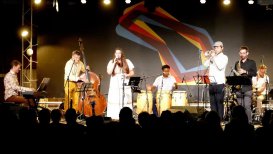BRANKO ARNSEK
MUSICAN - COMPOSER - PRODUCER - TEACHER
Bernd Epple August 22, 2025 - 2:34 p.m.
Bassist Branko Arnsek has gathered six top-class musicians around him. Photo: Bernd Epple
The Böblingen Jazztime series was a guest at "Summer at the Lake."
The Branko Arnsek Septet delighted the audience with a broad range of sounds.
He's no stranger to jazz in the region; however, over the years, Branko Arnsek, a Slovenian who grew up in Sindelfingen, has developed into one of the most sought-after bassists in numerous genres. After numerous stays in Cuba, the musical globetrotter with Balkan roots has dedicated himself particularly to Latin groove and assembled a band capable of musically translating it – including Cuban percussionist Marcos González Jimánez and Cuban singer Mayelis Guyat.
This was experienced at the Jazztime concert as part of the Böblingen event series "Summer at the Lake" in the Old TÜV Hall. Although Guyat had to miss Thursday evening due to illness, the approximately 150 attendees were still treated to fiery, Spanish-language singing. Arnsek, now also head of the pop-rock-jazz department at the Stuttgart Music School, organized a guest appearance at short notice by Lisay Torranzo Hernandez, also a Cuban singer from Munich. With rhythm in her veins, she conveyed Cuban joie de vivre with rich gestures and dance-like movement, occasionally garnishing it with jazzy scat phrases.
First Balkan Sound, Then Cuban Grooves
With Frank Eberle (piano), Michael Mischl (drums), Janos Löber (trumpet), and Andreas Francke (alto saxophone) from Schönaich, things got going right from the start. With sharp brass riffs and a percussive double bass solo, it began with a Slavic influence ("Becanovic"), followed by a transition to Cuban territory, where Francke clearly felt at home with a saxophone solo à la Charlie Parker. After about a quarter of an hour, González stepped to the fore for the first time with a delicate conga solo in "Obatala." Arnsek seemed to almost sink into his double bass, so immersed was he in his music. Eberle's fingers flew over the electric piano keys, refreshingly hinting at what was to come later. Already in the follow-up number, "D'Avinci," fiery unison phrases broke out of the overall structure and underscored Arnsek's compositional skills, with which he incorporates diverse ethnic influences into jazzy garb. "Balkan, jazz, salsa – it doesn't matter, it's all the same anyway," he would later explain with a wink later in the concert. Before the intermission, there was an almost flawless cha-cha-cha with "Charlie," further "Cubanized" by drummer Mischl, as well as singer Hernandez's radiant stage presence. "An exciting blend of Balkan, jazz, and Cuba – a joyful sauce, a very personal kind of salsa!" Jazztime's artistic director, Tilman Jäger, was also enthusiastic.
"I want to mix up a few rhythms here."
In the second part of the evening, the septet, thoroughly warmed up and applauded, managed to take it up a notch. "Balanza," a sensitive ballad, surprised with a beautiful piano solo, crisp unison interjections from the two wind instruments, brilliant scat passages, and for "Sirba me da," Arnsek strapped on the electric bass. "I want to mess around with some rhythms here," announced the cheerful bassist. He undoubtedly succeeded. The end of the program featured bebop elements, driving beats, rap influences, and magnificent solos from all the performers.
The loud calls for an encore were gladly met. "Dame alegría," which translates to "Give me joy," was a fitting title for the closing credits. Both the band and the audience thoroughly enjoyed the evening.
Branko Arnsek Septet in Böblingen
Ethno jazz with passion and spirit
